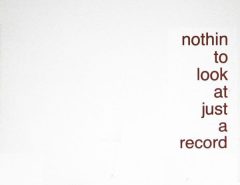Número especial dedicado a la escucha de la revista American Quaterly. El número viene editado por Kara Keeling and Josh Kun.
Music studies have long been fundamental to American studies, but sound—and the sensuous acts of listening and hearing—have just recently been attracting a wide range of scholarly attention. The ability to generate sonic matter—to listen, to hear some sounds and not others—involve practices and forms of labor, as the editors note in their introduction, that engage in and revolve around relations of power. These power relations enforce certain kinds of inclusions and exclusions, involving gender, race, class, sexualities, and other formulations of identity, points of contact, and instances of conflict. Sound is understood in this issue as a cultural form with a material force and the studies here occasion examinations into the sonic and aurality as processes of economic, social, and political negotiations.
View the Table of Contents. Authors who contributed supplementary content appear alphabetically below.
«Abolitionism’s Resonant Bodies: The Realization of African American Performance,» Alex W. Black
«Audible Citizenship and Audiomobility: Race, Technology, and CB Radio,» Art M. Blake
«Marian Anderson and ‘Sonic Blackness’ in American Opera,» Nina Sun Eidsheim
«The ‘War on Noise’: Sound and Space in La Guardia’s New York,» Lilian Radovac
«‘What, for me, constitutes life in a sound?’: Electronic Sounds as Lively and Differentiated Individuals,» Tara Rodgers
«Intimacy Threats and Intersubjective Users: Telephone Training Films, 1927–1962,» D. Travers Scott
«The Political Agency of Musical Beauty,» Barry Shank
«‘An Indian in a White Man’s Camp’: Johnny Cash’s Indian Country Music,» Dustin Tahmahkera




Leave a Reply
Lo siento, debes estar conectado para publicar un comentario.